Enterprise B2B SEO tools are essential for analyzing competitors and optimizing strategies to drive organic traffic and leads. These tools handle large-scale data, automate tasks, and integrate with business systems, making them ideal for complex operations. Here's what you need to know:
- Top Tools: Semrush Enterprise, Ahrefs Enterprise, BrightEdge, Conductor, and Botify lead the market.
- Key Features: Keyword gap analysis, backlink tracking, traffic insights, customizable reporting, and automation.
- Use Cases: Managing thousands of keywords, international markets, and large websites.
- Pricing: Ranges from $129/month (Ahrefs) to custom enterprise pricing ($10,000–$50,000+ annually).
Quick Comparison:
| Tool | Best For | Key Strengths | Starting Price |
|---|---|---|---|
| Semrush Enterprise | All-in-one competitor insights | SEO & PPC tools, global coverage | $139.95/month |
| Ahrefs Enterprise | Link-building campaigns | Largest backlink index, ease of use | $129/month |
| BrightEdge | Reporting & automation | Executive dashboards, workflows | Custom pricing |
| Conductor | SEO-content integration | Content workflows, collaboration | Custom pricing |
| Botify | Technical SEO | Crawl analysis, large site handling | Custom pricing |
These tools cater to different needs, from content creation to technical SEO. Choose based on your organization's specific challenges and goals.
Best SEO Tools (2025) - The Top Platforms Compared
Key Features to Look for in Enterprise B2B Competitor SEO Tools
When it comes to enterprise-level SEO tools for B2B companies, the key lies in handling massive data volumes, ensuring precise insights, and integrating seamlessly with existing systems. These tools need to scale effortlessly across multiple domains and international markets, provide accurate data to guide strategic moves, and connect smoothly with analytics and business intelligence platforms. Let’s break down these features and their importance for enterprise B2B strategies.
Enterprise organizations often juggle thousands of keywords across diverse regions and business units. While standard platforms might track a few hundred keywords, enterprise solutions like Semrush Enterprise can handle up to 5,000 tracked keywords and 40 projects for $499.95 per month. This kind of scalability is a must for managing intricate B2B portfolios with multiple products and target audiences.
In fast-paced B2B environments, up-to-date data is non-negotiable. Tools should offer real-time updates and extensive keyword and backlink databases. For example, Ahrefs boasts the largest backlink index in the industry, making it invaluable for analyzing competitors’ link-building strategies. Relying on outdated or incomplete data can lead to missed opportunities and poor decision-making.
Competitor Analysis Features
Competitor analysis is at the heart of any effective SEO strategy. Here are some standout features to look for:
- Keyword gap analysis: This identifies keywords your competitors rank for but you don’t, uncovering opportunities to create or optimize content.
- Backlink analysis: By examining competitors' link-building efforts, you can pinpoint high-authority referring domains and track link acquisition trends over time.
- Traffic insights: Understanding competitors’ top-performing pages, traffic sources, and audience behaviors can shape your content strategy and help you spot emerging trends.
These features go beyond just tracking competitors - they provide actionable insights to refine your SEO approach.
Reporting and Team Collaboration
Enterprise teams require tools that simplify complex data into actionable insights.
- Customizable reporting: Tailor reports for different stakeholders, whether SEO experts or executives. Visual dashboards that segment data by region, product line, or business unit make it easier to present findings in a clear, digestible way.
- Integration with analytics platforms: Tools that work seamlessly with Google Analytics 4, business intelligence software, and project management systems help centralize data. API access and compatibility with third-party tools further streamline reporting and connect SEO efforts to larger marketing goals.
Automation and Workflow Features
Automation is a game-changer for enterprise teams managing multiple campaigns simultaneously.
- Automated tasks: Features like rank tracking, site audits, and competitive monitoring save time and free up resources for strategy. Advanced tools even offer AI-driven recommendations and scheduled reporting to keep teams ahead of the curve.
- Real-time alerts: Notifications about competitors’ major moves - such as launching new content or acquiring influential backlinks - allow teams to adjust strategies quickly.
Automation ensures that enterprise teams can respond swiftly to market changes and align their SEO efforts with overarching business goals.
Lastly, security and compliance features like user permissions and audit logs are essential. They safeguard sensitive competitive data while ensuring that authorized team members can access the insights they need.
Best Competitor SEO Tools for Enterprise B2B
For enterprise-level B2B operations, SEO tools need to handle vast amounts of data, work seamlessly across complex site structures, and support collaboration among multiple teams. After evaluating the top platforms in the market, five tools stand out for their ability to provide deep competitor insights while scaling to meet enterprise demands. Each brings unique strengths tailored to specific needs.
Here’s a breakdown of the top five tools and what makes them valuable for enterprise B2B SEO.
Semrush Enterprise
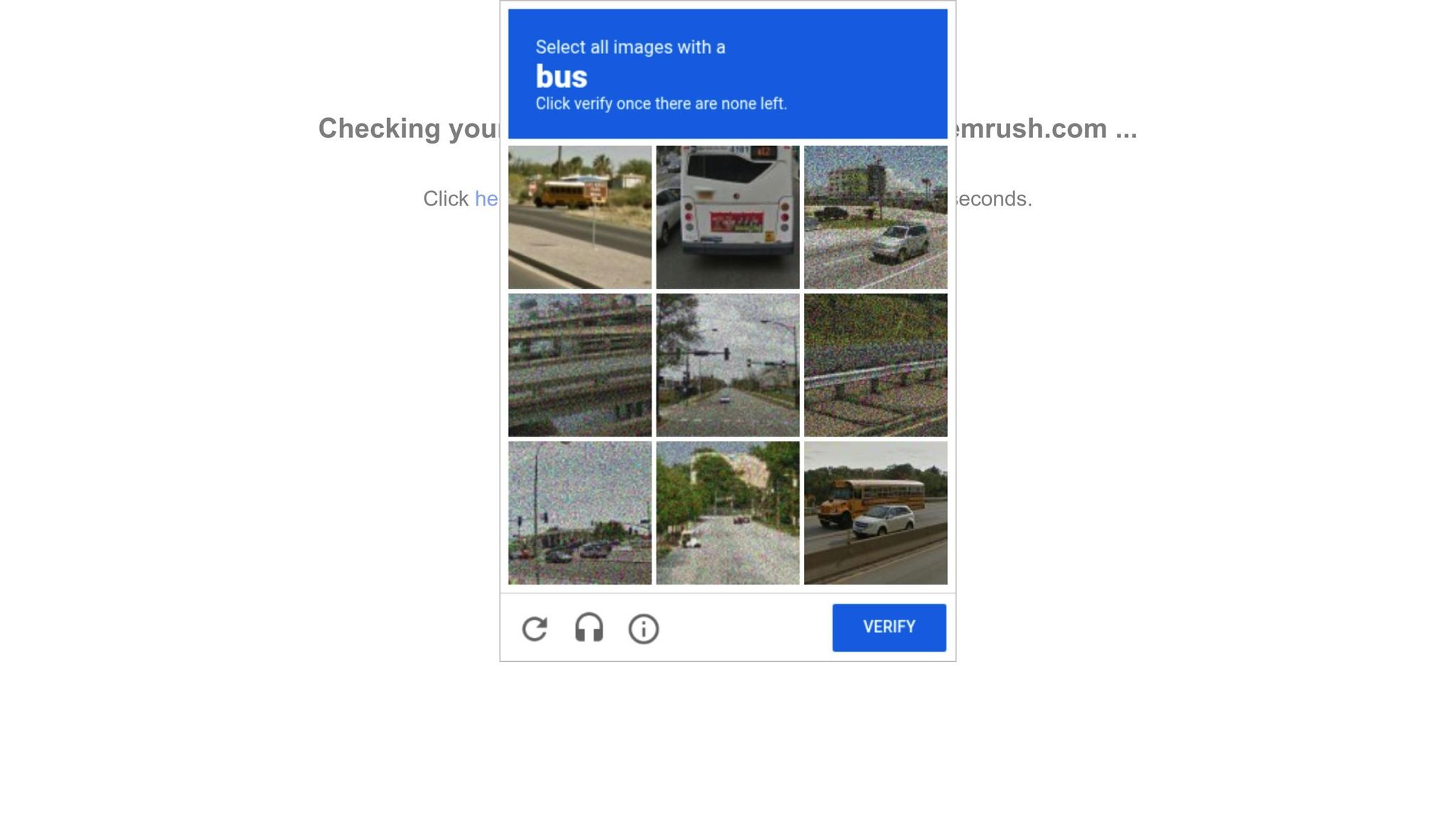
Semrush Enterprise is a powerhouse for large-scale B2B organizations, combining SEO and PPC competitor intelligence in one platform. One of its standout features is keyword gap analysis, which uncovers thousands of opportunities where competitors rank but your site doesn’t. Its global SERP coverage spans over 130 countries, making it a great fit for businesses with international reach.
The platform also offers detailed insights into competitor traffic, advertising spend, and content performance. Real-time alerts keep teams informed about competitors’ new campaigns, while integrations with tools like Google Analytics 4 and HubSpot ensure smooth data sharing across departments.
| Pros | Cons | Pricing |
|---|---|---|
| All-in-one platform with SEO and PPC tools | Steep learning curve for beginners | Starting at $139.95/month |
| Scales well for large teams | Limited automation for technical SEO | Custom enterprise pricing available |
| Strong reporting features | Dashboards may not fully meet C-suite needs | Discounts for annual contracts |
| Broad third-party integrations |
Ahrefs Enterprise
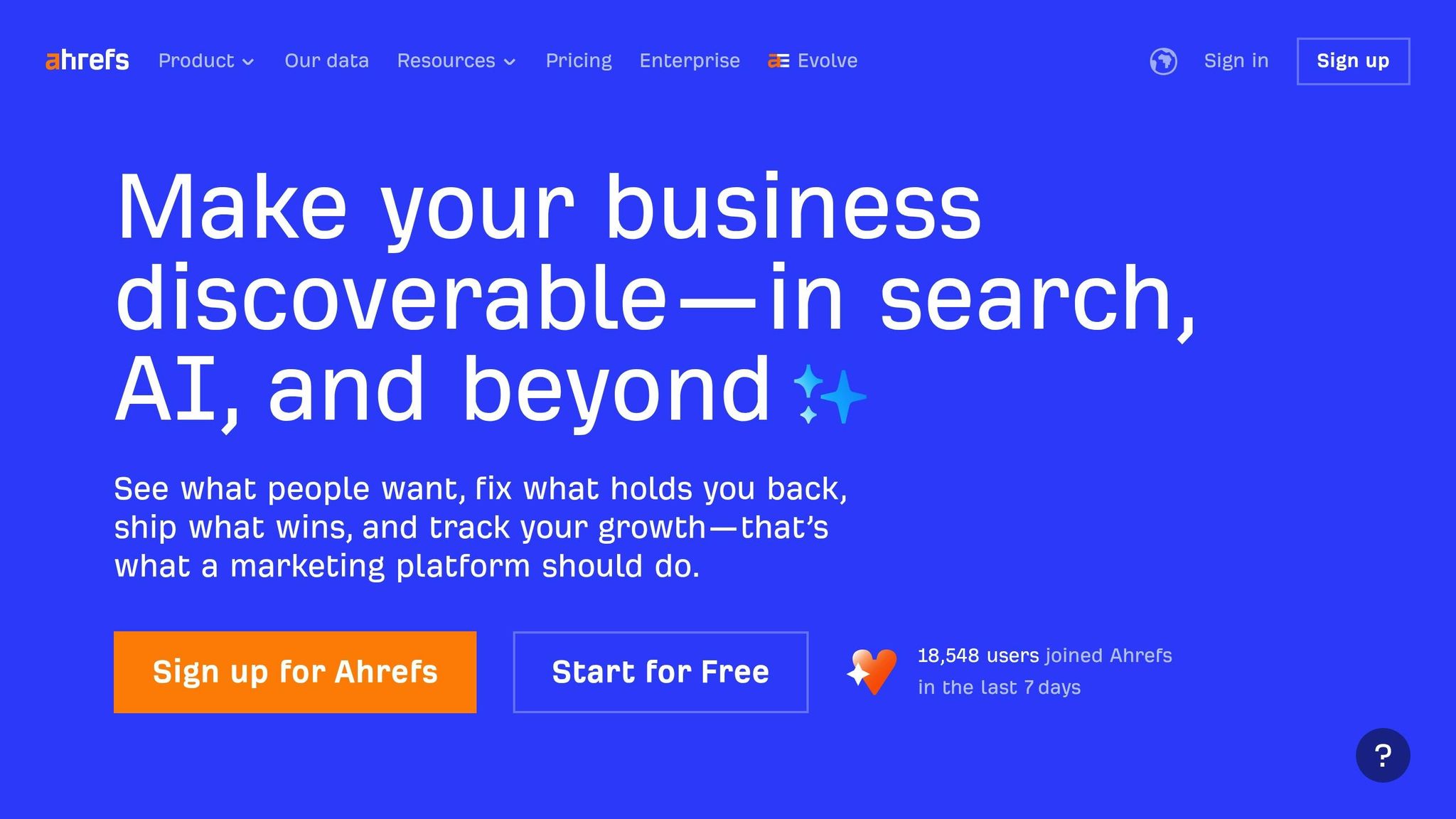
Ahrefs is a favorite for competitor analysis, thanks to its massive backlink database - the largest in the industry. This makes it especially useful for B2B companies aiming to close authority gaps with competitors. Its intuitive interface ensures even non-technical teams can dive into SEO strategies with ease.
The platform excels at identifying keyword gaps, estimating traffic potential, and assessing ranking difficulty. It’s also a go-to tool for digital PR teams, helping them track competitor link-building efforts and uncover high-authority domains. With frequent updates, Ahrefs ensures users get fresh, actionable data.
| Pros | Cons | Pricing |
|---|---|---|
| Industry-leading backlink database | Limited executive reporting features | Starting at $129/month for Lite plan |
| User-friendly interface | Lacks advanced workflow tools | Custom enterprise pricing available |
| Great for digital PR and link-building | Minimal PPC analysis capabilities | Savings available with annual plans |
| Regular updates with fresh data |
BrightEdge
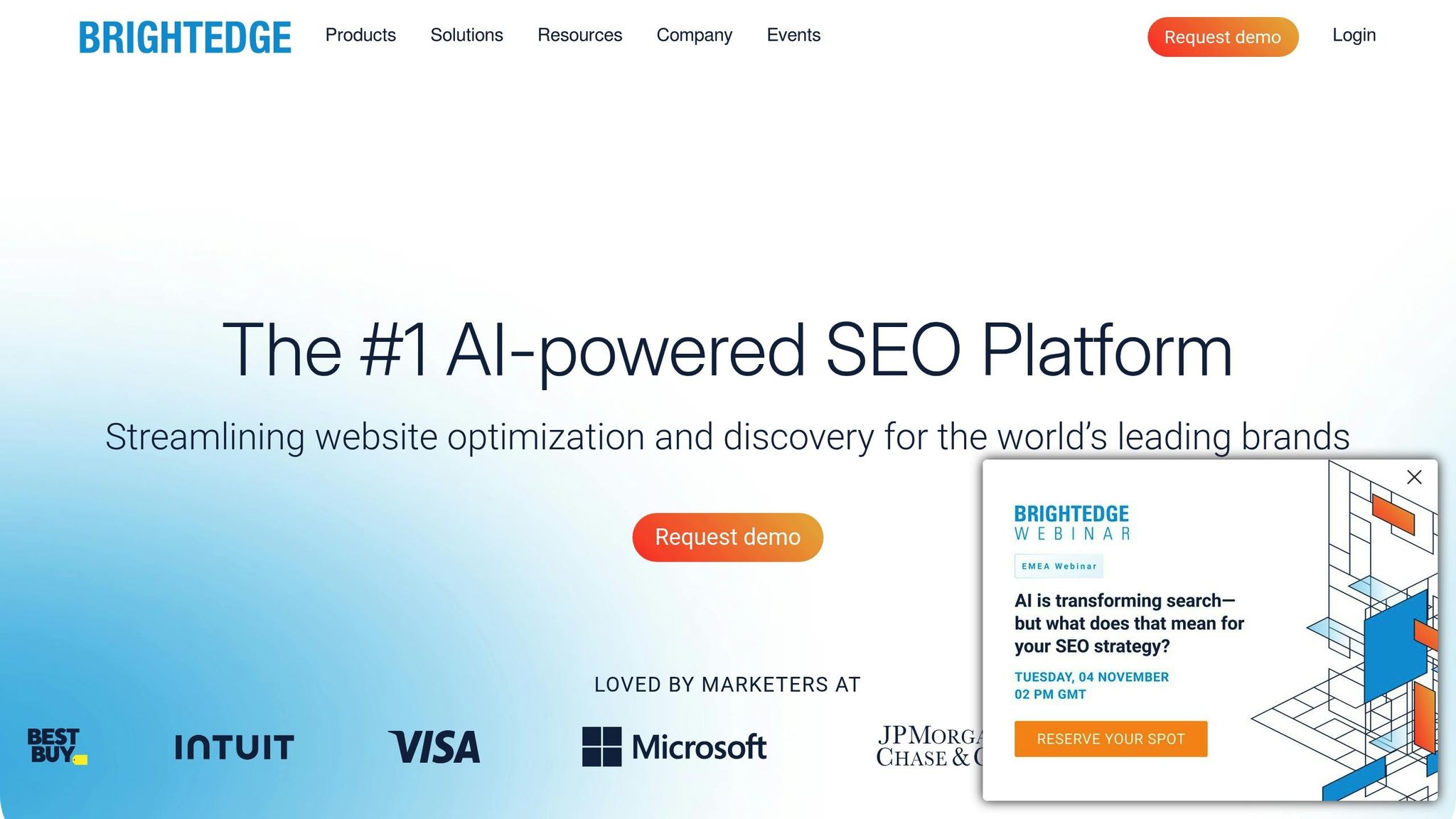
BrightEdge sets itself apart with its advanced workflow automation and detailed reporting tailored for enterprise needs. Its page-level recommendations are highly specific, offering actionable insights based on competitor analysis and search intent. This makes it particularly appealing for teams needing to showcase results to executives.
The platform automates competitor monitoring, identifies content gaps, and sends performance alerts. Teams can also create rules to respond to competitor actions, like launching new content or gaining backlinks. Integration with enterprise content management systems simplifies the process of turning insights into action.
| Pros | Cons | Pricing |
|---|---|---|
| Advanced automation features | High cost may deter smaller teams | Custom enterprise pricing only |
| Executive-friendly dashboards | Initial setup can be complex | Requires annual commitments |
| Detailed page-level insights | Overkill for smaller-scale operations | Pricing based on site size |
| Strong governance tools for enterprises | Lack of transparent pricing |
Conductor
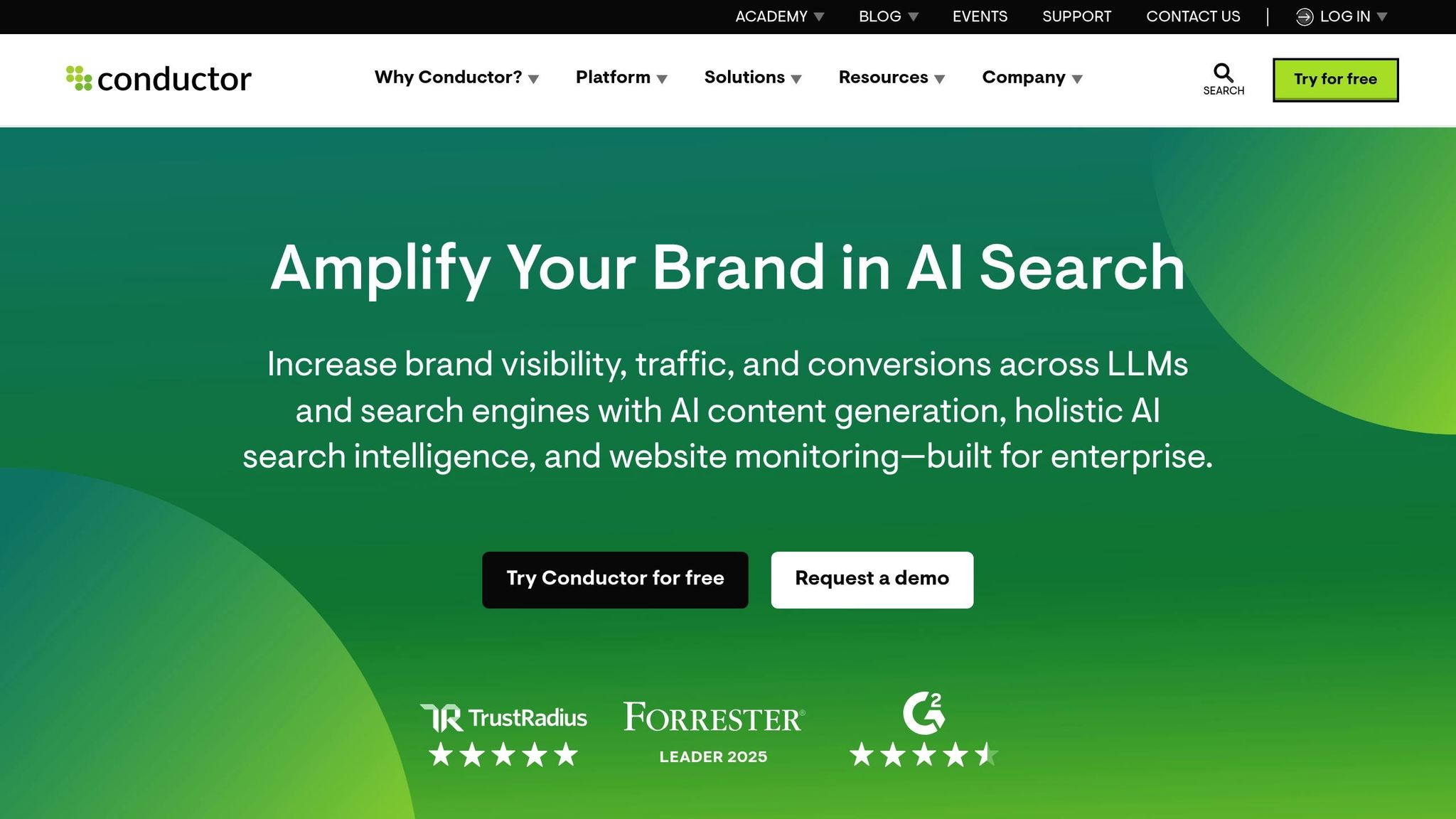
Conductor focuses on combining SEO with content marketing to drive lead generation. Its workflows guide content teams in creating optimized content based on competitor insights and keyword opportunities. The platform’s onboarding process is particularly thorough, helping teams hit the ground running.
With features like editorial calendars and automated workflows, Conductor bridges the gap between SEO and content teams. It also tracks competitor content performance, highlights content gaps, and suggests new topics to target.
| Pros | Cons | Pricing |
|---|---|---|
| Excellent SEO-content integration | Time-consuming setup | Custom enterprise pricing |
| Collaboration tools for cross-team efforts | Limited technical SEO focus | Pricing varies by content volume |
| Strong onboarding support | Non-transparent pricing structure | Annual contracts typically required |
| Automated topic recommendations | Less suitable for technical SEO teams |
Botify
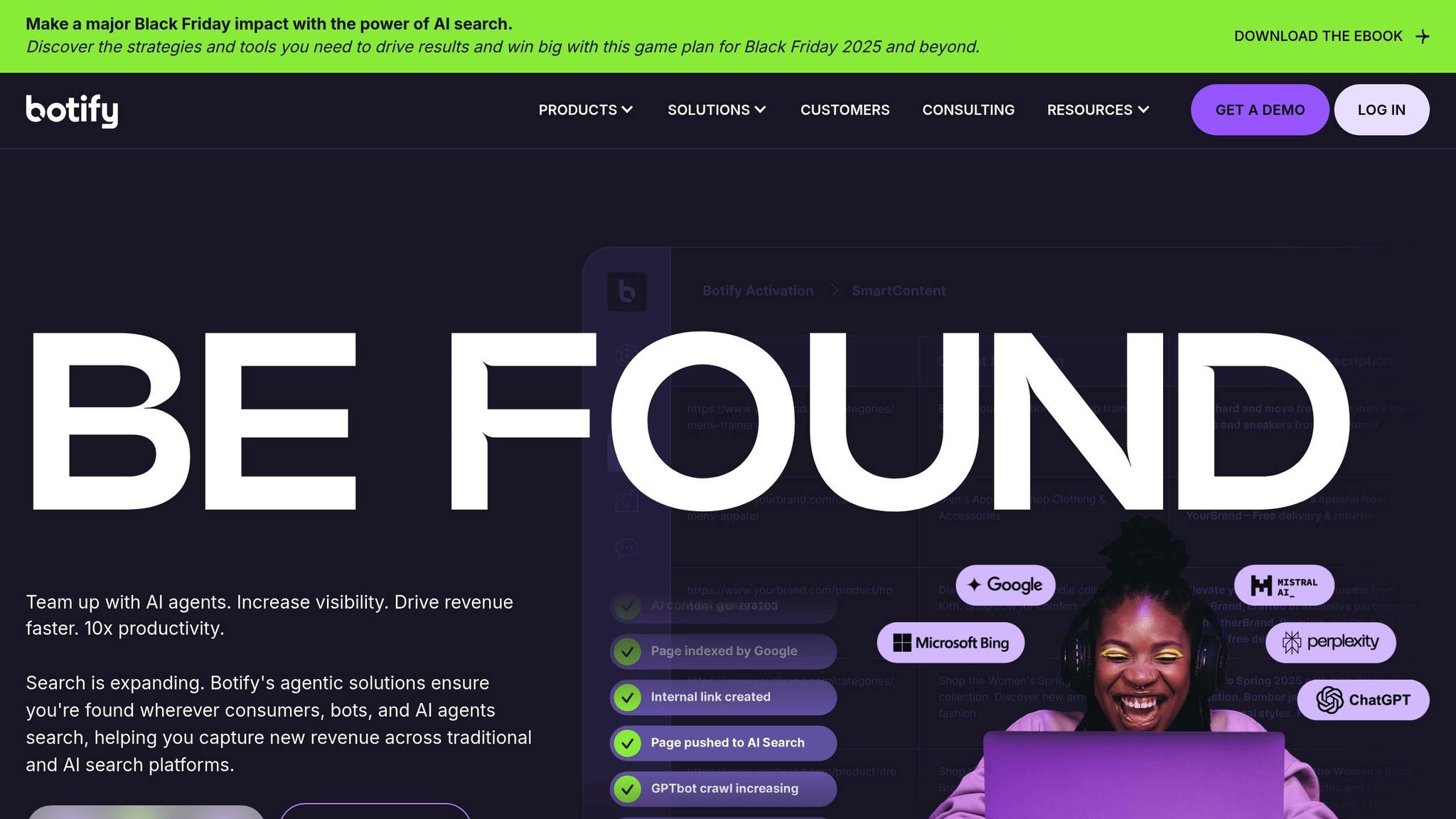
Botify is the go-to tool for enterprises managing complex website structures or massive e-commerce catalogs. Its strength lies in technical SEO, offering detailed log file and crawl analysis to uncover how search engines interact with your site. For businesses with multiple domains or international operations, Botify’s scalability is a major advantage.
The platform’s crawling capabilities can handle millions of pages, identifying technical issues that might affect SEO performance. While it’s highly specialized, it requires technical expertise to fully utilize its features, making it ideal for teams with dedicated SEO resources.
| Pros | Cons | Pricing |
|---|---|---|
| Unparalleled depth in technical SEO | High cost and complexity | Custom enterprise pricing only |
| Handles massive, complex site architectures | Requires technical expertise | Pricing based on crawl volume |
| Advanced crawl and log file analysis | Steep learning curve for non-technical users | Focused solely on enterprise needs |
| Perfect for multi-site and global enterprises | Limited content and keyword tools |
Tool Comparison Table
Here’s a breakdown of five leading SEO tools tailored for enterprise B2B teams. The table highlights their best use cases, standout features, potential drawbacks, and starting prices, offering a side-by-side comparison to help you make an informed choice.
| Tool | Best Use Case | Key Strengths | Main Limitations | Starting Price |
|---|---|---|---|---|
| Semrush Enterprise | Growth-stage SaaS companies needing fast competitor insights | All-in-one platform, competitive intelligence, easy implementation | Limited technical SEO automation, dashboards not C-suite polished | $139.95/month (custom enterprise pricing) |
| Ahrefs Enterprise | Digital PR and link-building campaigns | Industry-leading backlink index, easy for non-SEOs to use | Weak executive reporting, lacks workflow tools | $129/month (custom enterprise pricing) |
| BrightEdge | Enterprise content governance and executive reporting | Page-level recommendations, mature workflows, C-suite dashboards | High enterprise pricing, complex initial setup | Custom enterprise pricing only |
| Conductor | Content operations and team collaboration | Strong writer/brief workflows, excellent support | Lengthy implementation time, limited technical SEO focus | Custom enterprise pricing only |
| Botify | Technical SEO for large, complex websites | Deep log file analysis, handles millions of pages | High cost and complexity, requires technical expertise | Custom enterprise pricing only |
For teams on a budget, Semrush and Ahrefs offer beginner-friendly plans starting around $130–$140 per month. On the other hand, BrightEdge, Conductor, and Botify cater to larger enterprises with custom pricing that often falls between $10,000 and $50,000+ annually.
sbb-itb-5be333f
Other Enterprise SEO Tools Worth Considering
Beyond the top enterprise SEO tools, several other platforms offer unique capabilities tailored to specific needs, making them valuable additions to your SEO toolkit.
seoClarity stands out as an AI-powered platform designed to streamline automation and workflow management. Its Content Fusion AI helps optimize content and conduct keyword research for large-scale websites. This tool is ideal for enterprises handling complex, multi-site operations, as it reduces manual tasks with robust automation features. Plus, its customizable dashboards and reporting tools make it easier for executives to make informed decisions. Many enterprises rely on seoClarity to scale both content and technical SEO efforts efficiently.
Lumar (formerly Deepcrawl) focuses on technical SEO and quality assurance. It provides in-depth site audits and log file analysis, making it a go-to for organizations managing large, intricate websites. Its developer-friendly features, like seamless integration into enterprise workflows, help teams identify and resolve technical issues at scale. With the ability to crawl millions of URLs and deliver detailed insights, Lumar is perfect for enterprises that require ongoing technical health checks for their websites.
SpyFu offers an impressive library of historical competitor data spanning over 15 years. This tool allows enterprises to access competitors' keywords and PPC campaigns, helping them track long-term trends and understand how their competitors' strategies have evolved. For B2B companies, SpyFu is a treasure trove that reveals new opportunities by analyzing patterns in past performance.
Ubersuggest provides a cost-effective way to gain enterprise-level SEO insights. For as little as $29 per month, it delivers keyword research, competitor analysis, and site audit features. While it may not have all the bells and whistles of premium enterprise tools, Ubersuggest is an excellent supplementary option for quick insights and broad keyword discovery, especially for businesses mindful of their budget.
| Tool | Best For | Key Strengths | Starting Price |
|---|---|---|---|
| seoClarity | Enterprise technical & content SEO | AI-driven insights, automated workflows, customizable dashboards | Custom pricing (premium) |
| Lumar | Technical SEO at scale | Deep site audits, ability to crawl millions of URLs, CI/CD integration | Custom pricing (premium) |
| SpyFu | Historical competitor intelligence | Over 15 years of PPC/SEO data and competitive insights | $39/month |
| Ubersuggest | Budget-conscious comprehensive SEO | Keyword research, competitor analysis, and site audits | $29/month |
When paired with the primary enterprise SEO platforms, these tools provide specialized solutions for technical SEO, competitive analysis, and budget-friendly research. For example, enterprises often turn to seoClarity or Lumar to tackle technical challenges and automate workflows, while leveraging SpyFu for deep competitor insights and Ubersuggest for quick, supplementary keyword research.
US-based businesses will appreciate these tools' support for localized keyword databases, USD-based reporting, and US-standard date and time formatting, ensuring smooth integration into existing systems. For a deeper dive into these and other options, check out the Top SEO Marketing Directory to find the best fit for your strategy.
Directory Resource: Top SEO Marketing Directory
Selecting the right enterprise SEO tools can be a daunting task. That’s where the Top SEO Marketing Directory comes in - a carefully curated resource aimed at helping U.S. enterprises navigate the crowded landscape of SEO solutions and find tools tailored to their needs. By streamlining the vendor selection process, this directory builds on the insights shared earlier, making it easier to identify the best options.
This directory acts as a centralized hub for evaluating and comparing top enterprise SEO tools. From advanced competitor analysis to technical audits, it spans the full range of enterprise-level SEO capabilities. Whether you're considering industry giants like Semrush Enterprise and Ahrefs or niche tools focused on link building, content optimization, or workflow automation, this resource has you covered.
What makes this directory stand out is its emphasis on enterprise-level demands. Each listing provides detailed information on scalability, integrations, and advanced features designed for large B2B organizations. The directory is regularly updated to reflect the latest tools and trends, ensuring you have access to the most current data when making decisions.
For U.S.-based enterprises, the directory includes localized insights, such as pricing in USD and compatibility with platforms like Salesforce and HubSpot. It also features expert commentary and case studies to provide a deeper understanding of tool implementation, ROI expectations, and best practices for managing large-scale SEO initiatives. According to industry data, over 70% of enterprise B2B marketers rely on directories like this to simplify their research and speed up vendor selection.
Whether you're building your first SEO toolkit or scaling an existing one, the Top SEO Marketing Directory offers the guidance you need to make informed choices that align with your business goals and technical requirements. With its filtering options, you can easily narrow down tools based on functionality, pricing, and integration needs, ensuring a perfect fit for your enterprise.
Visit https://marketingseodirectory.com to explore these solutions and seamlessly integrate them into your SEO strategy.
Conclusion
Picking the right competitor SEO tool isn’t just a choice - it’s a strategy that can directly impact your organic growth and revenue. Tools offering real-time insights and advanced technical analysis are essential, especially when managing large-scale websites with millions of pages, coordinating teams, and translating complex data into actionable reports.
The key is to select a tool that aligns with your primary challenges. Whether you need Botify for in-depth crawling, Semrush for content velocity insights, Ahrefs for authority gap analysis, or BrightEdge for executive-level reporting, focus on what addresses your specific needs.
To get the most out of your investment, ensure the tool’s capabilities match your goals. For businesses prioritizing content-led strategies, all-in-one platforms like Semrush Enterprise often provide a broad range of features. On the other hand, enterprises facing significant technical hurdles might benefit from combining specialized tools for a more tailored and cost-effective solution.
Start strong by conducting keyword gap analyses, examining competitor backlink profiles, and setting up automated monitoring systems. These quick wins can help you respond faster to algorithm changes and stay ahead of competitors.
Success doesn’t stop at choosing the right tool. Teams must be well-trained to fully utilize advanced insights and turn them into actionable strategies that deliver measurable results. Proper training ensures every feature of the tool contributes to achieving your SEO objectives.
Investing in enterprise-grade SEO tools isn’t just about improving rankings - it’s about reducing customer acquisition costs and driving qualified leads. By tying organic performance improvements to pipeline value, you can build a solid ROI case for your SEO efforts.
Ultimately, gaining a competitive edge means making informed decisions quickly and executing at scale. With the right tools and resources - like the Top SEO Marketing Directory - your organization can capture prospects early and maintain sustainable growth.
FAQs
What should enterprise B2B companies look for in an SEO tool for competitor analysis?
When choosing an SEO tool for competitor analysis, enterprise B2B companies should prioritize options that cater specifically to their complex requirements. Features like detailed keyword tracking, competitor benchmarking, and insights into trends within your industry can provide a competitive edge.
It's also important to select a tool that can handle large volumes of data and support intricate campaigns. Look for platforms with strong analytics capabilities to aid in making informed, data-backed decisions. Finally, a tool with an intuitive interface and dependable customer support can make integration smoother and ensure your team can use it effectively.
How do enterprise SEO tools like Semrush and Ahrefs work with existing business systems to improve SEO strategies?
Enterprise-level SEO tools such as Semrush and Ahrefs are designed to work effortlessly with a variety of business systems, making it easier to manage data and improve workflows. These tools often integrate with platforms like CRMs, CMSs, and analytics software, creating a centralized hub for data that supports smarter decision-making.
For instance, they can sync keyword performance data directly with your content management system, enabling you to fine-tune your content without leaving your current setup. They also offer API access, which opens the door to custom integrations. This means businesses can automate reporting, track performance metrics, and align their SEO strategies with broader marketing goals - all without adding unnecessary complexity.
How do automation and real-time alerts in enterprise SEO tools benefit large-scale campaigns?
Automation and real-time alerts in enterprise SEO tools offer game-changing benefits for managing large-scale campaigns. Automation takes care of repetitive tasks like keyword tracking, content audits, and backlink monitoring. By handling these time-consuming processes, it not only saves hours of manual effort but also reduces the risk of human error. This means your team can shift their focus to high-level strategy and in-depth analysis.
On the other hand, real-time alerts act as your early warning system. They flag critical changes - like sudden ranking drops, website issues, or competitor moves - so you can respond immediately. This quick reaction helps minimize disruptions, safeguard your search performance, and maintain a competitive edge. When combined, automation and real-time alerts boost efficiency and empower smarter decision-making, making them essential for enterprise-level SEO management.


